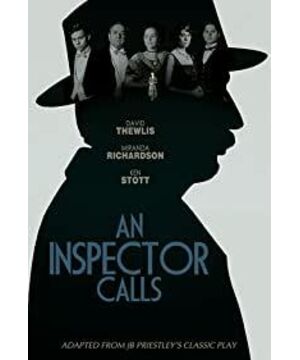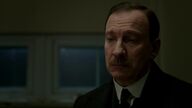Let’s talk about structure and style first. The structure of this film is a very good thing for me to watch. Because it is adapted from a stage play, the structure naturally becomes segmented. The story between each protagonist and the girl who commits suicide is divided into one scene, the story of each scene is further advanced, and the moral criticism of each scene is deepened. The style is also a strong theater style. The way each protagonist speaks his lines has a clear cadence and emotion, which also makes the film more dramatic. Speaking of which, I was very curious when I watched the movie, how the director expressed the transition between different scenes when the story was in the theater. It seems that I must go to the theater to see it with my own eyes when I return to the UK.
Then tell the story. At first I thought this film was very straightforward. A detective came to the door because of the suicide of a young girl, and then every member of the family confessed to the crime against the girl under the inducement and scolding of the detective. In the end, the detective convicted everyone like God's "Final Judgment", and indignantly told the truth of "do not do evil for small things" and left the scene angrily, leaving everyone to repent and all sentient beings. For me, however, things really started to get interesting after the inspector was gone, when this upper-class family started to reflect on the whole thing, analyzed the inspector's intentions, and made a few phone calls to investigate that it wasn't. An Inspector Goole, and no girl commits suicide. The family began to celebrate, it turned out that it was just a prank, the girl was not dead, and even the "this girl" everyone said was not necessarily the same girl. Then, as the story turned, God's perspective appeared, "this girl" was the same girl, and the girl did commit suicide. The "inspector" learned everything through the girl's diary, and ran after the girl committed suicide. Went to the capitalist's house to stage this play. It was at this time that the capitalist received a call and was told that a girl had died, and that the real police station was coming to take a statement.
Therefore, the arrival of this "Detective" is just a preview. Or, not so much a visit from a detective as a visit from a devil who pre-judged the capitalist family before everything happened, so that they could face their sins before using their power to escape a public scandal . I do hope that the screenwriter had the second intention, so that this story can truly be called a thriller, rather than a simple farce where a passer-by A comes out on behalf of a suicide girl.
Finally, let's talk about the moral condemnation of the film. The director used the detective's mouth to condemn everyone in the capitalist family and sentenced each of them to be responsible for the girl's death. Of course, this is true in a broad sense, because everything that everyone does has an impact on the people around him, more or less, beyond the person's control. Yes, everyone in this family pushed the girl down the road, but are they really responsible for the girl's death? Is this girl really innocent? It seems not so. Moreover, in my opinion, what the future son-in-law does to the girl will help more than hurt. At least the girl will have a place to live, love, and financial resources for a few months, right?
Of course, the story is still pretty good. In the end, the exaggerated interpretation is to warn people of a truth: don't do good for small things, and don't do evil things for small things. In this way, the Chinese ancestors have the strongest generalization ability.
View more about An Inspector Calls reviews











